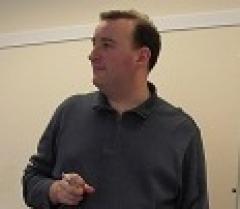David Worsley

David Worsley is the Risk & Value Manager for Network Rail's London North Eastern Route, and is also a Visiting Lecturer at the Centre for Railway Research at Newcastle University. He has a Diploma in Statistics, Certificate in Mathematics, and a Certificate in Quantitative Studies for Business from the Open University.
Why did you decide to study with the OU?
I did maths A-Level, but I don’t think the real-world applications were properly explained at school, so I didn’t study any maths for almost 15 years. Ten years ago, I was working in the railway industry, and I was given a job as a project risk analyst, based partly on the little maths that I did know. I realised that in order to pursue that career fully I would need to expand my knowledge of statistics in particular, so I undertook the Certificate in Quantitative Studies for Business, Certificate in Mathematics, and Diploma in Statistics at the OU. I did enough maths in these three qualifications to be eligible for full membership of the Institute of Mathematics and Its Applications, which I obtained in 2010.
Describe your experience of studying for your OU qualifications.
The period during which I was studying mathematics with the Open University was very demanding, as I was adjusting to a new job and undertaking a professional qualification with the Institute of Risk Management at the same time. My employer gave me study leave and paid for that course, but I did the OU qualifications in my own time and at my own expense; the incentive that kept me going was the realisation that after three years of hard work I would be qualified in both the managerial and mathematical aspects of my new profession, and thereby in a very strong position to progress in the rail industry.
What made my success possible was the high standard of tuition I received at the OU; a two-hour tutorial from each tutor seemed to impart as much knowledge as days of reading alone. I found myself travelling to adjacent regions when possible in order to benefit from additional tutorials, and I attended the OU mathematics revision weekend at Aston University.
What have you done since you finished studying?
Shortly after completing the Diploma in Statistics, I moved to a job in strategic planning at Network Rail, and I eventually rose to be responsible for long-term planning of the East Coast Main Line. I thus had the opportunity to use maths in cost estimating, demand forecasting, economic modelling, and strategic decision analysis; in particular, all of these applications were used by the committee that chose the locations for the stations on High Speed 2, on which I represented Network Rail’s interests. I was once even involved in an engineering simulation project, examining the perennial problem of “leaves on the line”, in which I used techniques that I had learnt on an OU probability course.

Kings Cross Concourse: One of the projects for which David undertook some risk analysis
I’m back working in project risk management again now, but in a more senior role which has allowed me to help expand the responsibilities of the department to include the complicated statistical analysis required for whole-life cost modelling of new assets. Network Rail intends that this initiative will save the taxpayer over £3 billion in costs over the next 20 years. I also teach many of these applications of mathematics as a Visiting Lecturer at Newcastle University’s Centre for Railway Research, and in this capacity I have been nominated to take part in a European Union funded project that will share this knowledge at a series of conferences across the continent over the next 3 years.
How have your OU qualifications helped your career?
The effort that I put in to studying at the OU in my mid-30s in order to become a qualified mathematician meant that as I turned 40 my career really accelerated, and I now have the opportunity to make a contribution to the railway industry at an international level. As mathematics underlies both risk analysis and many of the tools used in strategic planning, I have been able to make an impact in two professional fields, and I’m now enjoying teaching what I have learnt at University level myself.
What advice would you offer to a prospective student considering study at the OU?
The first suggestion that I would make is that new students plan their studies so that they can pick up intermediate qualifications on their path to a full degree; the prospect of earning certificates or diplomas along the way should make the potential six-year study period seem more digestible. You can also experience a sense of achievement when each qualification is gained, which helps to motivate you for future efforts.
Meanwhile, my main advice would be to take full advantage of tutorials; the opportunity to interact with your tutor and really concentrate on what you are being taught can often make difficult mathematical topics suddenly become comprehensible.
Meet our Academics

In addition to teaching on Open University modules our academics are engaged in ground breaking research that benefits individuals and society.
Request your prospectus
Explore our qualifications and courses by requesting one of our prospectuses today.
Request prospectusAre you already an OU student?
Upcoming Events
No events